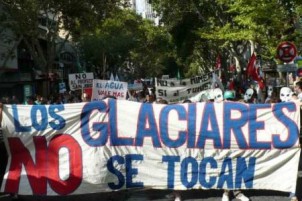
By Miningwatch, Canada. In March 2012, Canadian taxpayers will pay eleven journalists from eight Latin American countries to attend the Prospectors and Developers Association of Canada’s 2012 conference (PDAC), including paid visits to mine sites in Quebec. Instead of managing the real-life problems associated with mining in the countries they operate in, they consider it cheaper to manage the message around mining. The examples of these real-life problems are plenty. A snapshot of just a few of them:
- Osisko Mining’s exploration project in the province of La Rioja, Argentina, faced a blockade due to concerns over water supplies. It was only lifted a month later, when the company guaranteed it would first ‘obtain local support’.
- In Honduras, mine-affected communities and environmental and indigenous organizations are protesting a proposed mining law that Honduran authorities are promoting at PDAC this week, also with support from the Canadian Department of Foreign Affairs.
- Ecuadorian organizations kick off a big march on the national capital on March 8, starting from the south of the country where communities and their representatives have demonstrated against a Canadian mining project (see our previous blog)
“Government and industry representatives are sure to give these journalists a glowing picture of Canada’s disingenous Corporate Social Responsibility framework for mining overseas, while trying to demonstrate that mining is developing without a hitch here at home,” remarks Ramsey Hart, Canada Program Coordinator for MiningWatch Canada. Question is: will the journalists tell the real story behind these projects or write what the ones funding their trip will like to read? They sure have plenty of opportunities to see the problems related to mining in Canada:
- On Tuesday, members of Kitchenuhmaykoosib Inninuwug (KI First Nation) were at PDAC to demonstrate against the failure of the Ontario provincial government to ensure that mining exploration company God’s Lake Resources respects their right to free, prior, and informed consent.
- Osisko Mining’s open-pit gold operation in Malartic, Quebec, which visiting journalists might tour, has led to discontent among community members who claim the company betrayed its promises to ensure that they would face no major problems during the mine’s construction. Noise, dust, plummeting housing values, and a disappointing relocation process have led citizens to protest.
“The government-sponsored tour is unlikely to acknowledge conflicts that have arisen that are important to understanding the difficulties that aboriginal and non-aboriginal people in Canada face in having their rights respected and community health protected,” adds Mr. Hart. Meanwhile, in British Columbia, the Tsilhqot’in People are having to re-engage in a review process of an already-rejected proposal for an open pit gold and copper project, and where the proponent recently launched a lawsuit against an environmental group critical of its project. So let us get this straight: either your opinion is not asked and the project goes on regardless of what you think. Either your opinion is asked but when you give the wrong answer you will be asked again, or sued. One can only hope that the paid journalists visiting Canada’s mines will unearth the ugly truth about mining, concluding that what is needed most is environmental justice for their people.
In Ottawa: Jen Moore Latin America Program Coordinator MiningWatch Canada (613) 569-3439.
In Toronto: Ramsey Hart Canada Program Coordinator MiningWatch Canada (613) 298-4745).

The project ENVJUSTICE has received funding from the European Research Council (ERC) under the European Union’s Horizon 2020 research and innovation programme (grant agreement No. 695446)